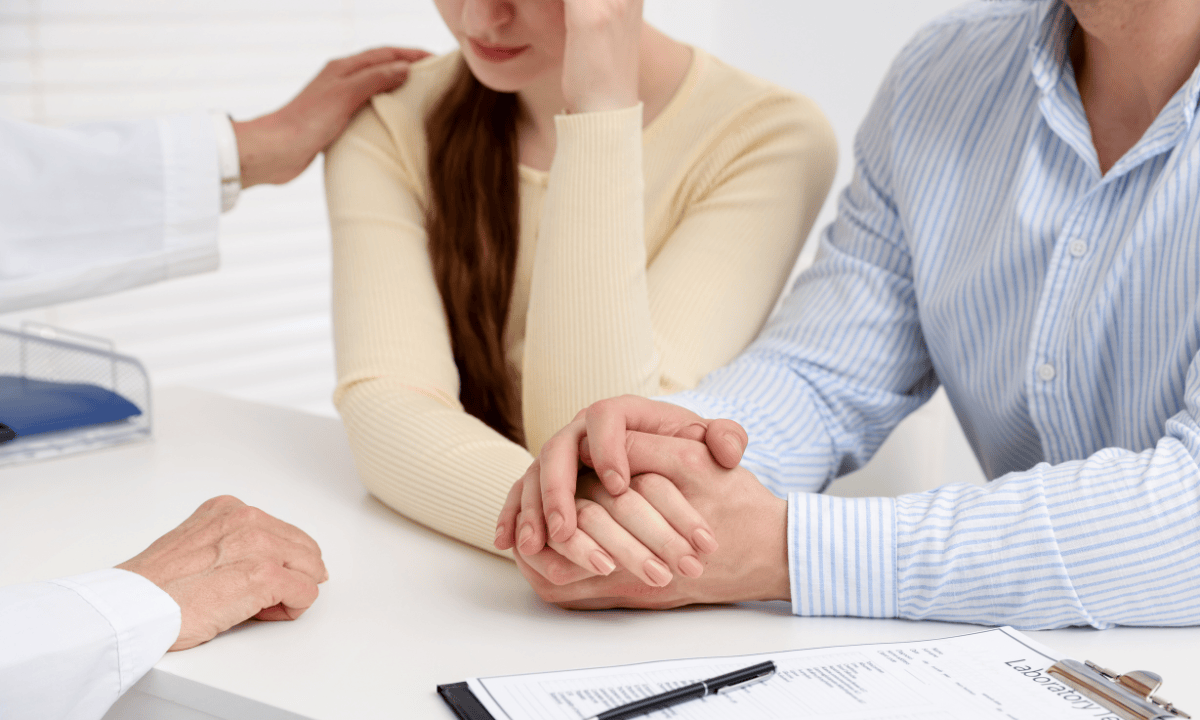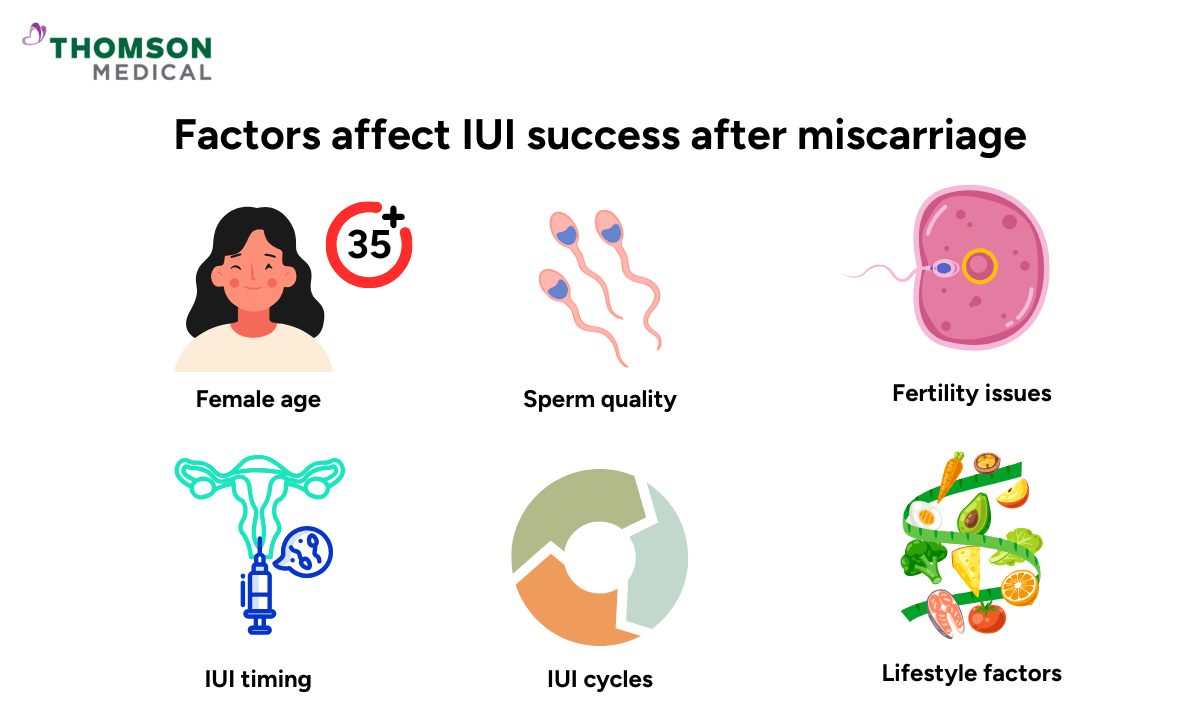Experiencing a miscarriage after trying to get pregnant can be disheartening and emotionally draining, especially if you have tried your best. As you begin to heal, you may wonder when you can try again and whether fertility treatment such as intrauterine insemination (IUI) could help.
The good news is that IUI after a miscarriage is both possible and safe. However, it's important to give your body and mind time to recover first. With the right medical guidance and care, you can move forward towards a healthy pregnancy when you’re ready.
What is IUI?
Intrauterine insemination (IUI) is a type of fertility treatment that helps you get pregnant by putting your partner's sperm directly into your womb. Before the procedure, your doctor will take a sperm sample from your partner and wash it to collect the healthiest and most active sperm.
After that, your doctor will gently put the washed sperm into your womb using a thin, flexible tube (catheter). This procedure shortens the distance that the sperm must travel to reach the egg resting in the fallopian tube.
IUI is less invasive and more affordable than other fertility treatments, like in vitro fertilisation (IVF). Couples who are having trouble getting pregnant for no clear reason, have male factor infertility, a low sperm count, or have cervical problems that make conception difficult are often recommended this fertility treatment as their first option.
What is a miscarriage and why does it happen?
A miscarriage, also known as spontaneous abortion, is a loss of pregnancy before 24 weeks. Most miscarriages occur due to chromosomal changes in the embryo that happen during early development and are not caused by anything you or your partner did.
Here are some of the most common causes of miscarriage:
Chromosomal abnormalities
When an egg and sperm come together, two sets of chromosomes, one from each parent, join together. If the embryo has too many or too few chromosomes, miscarriages may occur.
Maternal health conditions
Women with health conditions such as uncontrolled diabetes, infection, hormonal imbalances, uterine or cervical issues, thyroid disease or obesity may have an increased risk of miscarriage.
Lifestyle factors
Women who smoke or drink too much alcohol are at an increased risk of miscarriage.
Can you try IUI after a miscarriage?

Yes, you can try IUI after a miscarriage. A single miscarriage usually doesn’t affect your ability to get pregnant again, and your ovulation often resumes within a few weeks. Many women have healthy pregnancies, whether naturally, through IUI, or with IVF.
However, you should consult your fertility specialist or obstetrician to ensure your body has recovered and is ready for the next pregnancy.
Remember that while IUI improves your chances of conception, it does not prevent miscarriage. This procedure puts the sperm directly into your womb, but it doesn’t address underlying causes of miscarriage, such as chromosomal abnormalities or other health issues.
If you have experienced recurrent miscarriages (two or more consecutive losses), it's important to discuss with your fertility specialist. They may recommend additional investigations to identify any underlying causes that can be addressed before trying IUI again.
When is it safe to try IUI again after miscarriage?
It’s generally best to wait at least one menstrual cycle (around 4-6 weeks) before trying IUI after a miscarriage. This gives your body time to heal and your hormones to return to normal. In some cases, your doctor may advise waiting up to three months for optimal recovery.
If you’re considering IUI after a miscarriage, our fertility specialists at Thomson Fertility Centre can help to plan your next steps safely when you're ready. Request an appointment to receive personalised advice tailored to your recovery and fertility goals.
Our IUI specialists in Singapore
Loading...
Emotional and physical recovery before trying IUI
Getting better emotionally
A miscarriage can be emotionally challenging. Give yourself time to grieve and heal emotionally before starting another IUI cycle. Spending time with your loved ones and participating in your hobbies may help you feel more at ease and at peace.
Physical recovery
Your body also needs time to recover from miscarriage. Your womb will return to its normal size after at least one menstrual cycle. At this point, you also need to eat healthy foods, drink enough water, and get enough sleep. If you experience fever, severe pain, or heavy bleeding, contact your doctor immediately.
Factors that affect IUI success after a miscarriage

Many factors can affect how well IUI works after a miscarriage, such as:
- Your age:
- Your fertility naturally goes down after age 35.
- Sperm quality:
- The shape and movement of sperm affects fertilisation and implantation success.
- Underlying fertility issues:
- Endometriosis, blocked fallopian tubes, or uterine abnormalities can make IUI less likely to work.
- IUI timing:
- The timing for IUI and the use of fertility medications may increase the success rate of IUI after a miscarriage.
- Number of IUI cycles:
- Success rates tend to be highest in the first three to four cycles before decreasing.
- Lifestyle factors:
- Maintaining an ideal body weight, avoiding smoking, and alcohol can help improve IUI success rates.
What to expect after IUI following a miscarriage
IUI is still a safe and effective way to get pregnant after a miscarriage. You may experience some symptoms after the procedure, like spotting and cramps in your stomach.
If the IUI works, the embryo will implant between 6 and 12 days after the IUI, so you might notice early pregnancy symptoms. Your doctor usually recommends a pregnancy test two weeks after the procedure.
While some women get pregnant after one IUI cycle, others may require several cycles. Your fertility specialist will help you figure out the best timing and plan for your individual situation.
Every fertility journey is unique, and you don’t have to walk yours alone. When you feel ready to try again, our fertility specialists at Thomson Medical are here to guide you towards a healthy pregnancy.Request an appointment today.
FAQ
Is IUI successful after a miscarriage?
Yes, IUI can still be successful after a miscarriage. Some women may get pregnant after one cycle of IUI, while others may need several cycles.
How long should I wait to try IUI after a miscarriage?
It’s best to wait around three monthsfor full physical and emotional recovery. This allows your body to heal completely and prepares your womb for a healthy pregnancy.
What tests are needed before trying again?
Your fertility specialist will recommend a few tests to ensure your body is ready for IUI after a miscarriage, such as:
Hormone tests to check your reproductive balance
Semen analysis for your partner
Imaging tests like ultrasound to examine your womb and fallopian tubes
Chromosomal or genetic testing if recurrent miscarriage is suspected
Thyroid and hormonal screening for thyroid disorders and polycystic ovarian syndrome (PCOS)
Is miscarriage rate lower with IUI?
No, the risk of miscarriage with IUI is the same as with natural conception. IUI increases your chances of getting pregnant by putting sperm closer to the egg, but it doesn't lower the risk of miscarriage, which depends on things like your age, the quality of your eggs, and your genetic health.
Is it harder to conceive after a miscarriage?
No, a previous miscarriage does not make it harder to get pregnant again. Once your body has recovered and underlying causes (if any) are addressed, your chances of conception are maintained.
How to get pregnant quickly after a miscarriage?
It’s best to take care of your physical and emotional health to increase the chance of conception after a miscarriage:
Eat a balanced diet rich in protein, antioxidants, omega-3 fatty acids, and vitamins
Drink 2-3 litres of water daily
Maintain an ideal body weight
Exercise regularly with moderate-intensity exercise like brisk walking or swimming
Sleep at least 7-9 hours per night
Avoid smoking
Cut down on inflammatory foods, including caffeine, sugar, processed meat and alcohol
The information provided is intended for general guidance only and should not be considered medical advice. For personalised recommendations and advice based on your unique situation, please consult a specialist at Thomson Medical. Request an appointment with Thomson Medical today.
For more information, contact us:
Thomson Fertility
- Paragon: 6252 7766
Thomson Specialists (Women's Health)
Request an Appointment